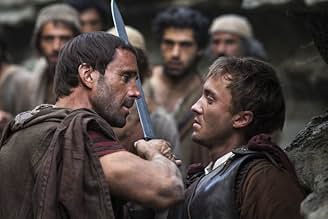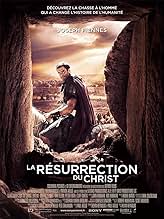In 33 AD, a Roman Tribune in Judea is tasked to find the missing body of Jesus Christ, who rose from the dead.In 33 AD, a Roman Tribune in Judea is tasked to find the missing body of Jesus Christ, who rose from the dead.In 33 AD, a Roman Tribune in Judea is tasked to find the missing body of Jesus Christ, who rose from the dead.
- Awards
- 3 nominations
María Botto
- Mary Magdalene
- (as Maria Botto)
Joe Manjón
- Simon the Canaanite
- (as Joe Manjon)
Storyline
Did you know
- TriviaDuring Batholomew's interrogation, Clavius threatens to crucify him, to which Bartholomew replies that he'd happily submit, "Just strike." According to Christian tradition, Batholomew was eventually crucified for his faith.
- GoofsAfter the earthquake at the beginning, Lucius said that Poseidon was unhappy. Poseidon is a Greek god. Lucius should have mentioned Neptune, the Roman counterpart of Poseidon.
- ConnectionsFeatured in The Saturday Show: Episode #1.21 (2016)
Featured review
Risen gave a fresh but solemn view of the biblical story of the aftermath of Jesus's crucifixion as it tells the story through the eyes of a conflicted and emotionally drained Roman soldier named Clavius. Clavius seems more of a tired observer with his deep stare and mellow manner, and he seems appalled by the violence that the Roman soldiers perform, violence that he himself is called on to perform as well. He is tired of it all and wants to retire to a quiet life with a family, without witnessing any more deaths. None-the-less, duty demands that he kill from time to time, which he dutifully does, and he seems half mortified over this, and half compliant. During the battle in the beginning of the movie, Clavius apathetically kills a Jewish rebel, and later, during the tri-crucifixion scene, he orders a Roman soldier to break a prisoner's leg as he's dying on the cross, then runs his spear through Jesus's ribs, and he's no more bothered by this than if someone fender-bendered him at the supermarket.
The way Fiennes played his role as a troubled Roman official was intriguing, capturing civilians to question them about the whereabouts of Jesus's body, then dismissing them at will. The viewer expected Clavius to perhaps resort to violence or torture to get his captures to speak and reveal where Jesus's body is, knowledge that he desperately needed to satisfy his commander, Pontius Pilate. However, Clavius never quite went that far, either out of compassion or exhaustion. While Fiennes was cast well, Curtis, who plays Jesus, is a cross between a California hippie and a happy skateboard dude in a Coke commercial. In his final good-bye scene, Jesus glibly calls across the sand yelling his farewell as if mom was telling her kids to be good while dad's in charge.
Clavius's young side kick Lucius is played by Tom Felton, and unlike Draco, Lucius follows Clavius around looking confused. Bartholomew was my favorite character. Clavius demands that Bartholomew tell him where Jesus's body is, and Bartholomew grins flippantly and conveys that he ain't telling nothing'! Clavius interrogates him more harshly, kicks him to the ground, and Bartholomew gets up and slowly approaches Clavius, solemnly bends down to his ear, and says, "he's everywhere!" Then Bartholomew beams and prances away; the joke's on Clavius! The only more comical scene was when Clavius asked a group of men, "Does any of you know Mary Magdalene?" and all of them raised their hands. One more -- I was amused when Mary Magdalene looked like Miss Karate Woman beats Godzilla when she kicked an advancing soldier out of her way and escaped through a stone window. Mary is cast well, but her role is too brief, as is all the twelve disciples who are never given any individual definition (except for Simon, who sometimes pouts, and who sometimes is as happy as Santa Claus). Pontius Pilate is old and whiny and is fixated on not upsetting public opinion. Maybe he was really like that, but they don't show the inner turmoil he must have felt being forced to kill an innocent man to placate the masses.
We all know the ending, but Risen takes an unorthodox (if you will) direction. We see facial expressions of shock and realization that tell the story better than computer-generated special effects, and we are constantly grounded into this time period with the frequent buzzing of flies over rotting bodies, hair filled with dust and sand, broken statues of the gods, and earthquakes that crack massive stone gates. Thus, Risen shows instead of tells, and doesn't preach, thank God.
The way Fiennes played his role as a troubled Roman official was intriguing, capturing civilians to question them about the whereabouts of Jesus's body, then dismissing them at will. The viewer expected Clavius to perhaps resort to violence or torture to get his captures to speak and reveal where Jesus's body is, knowledge that he desperately needed to satisfy his commander, Pontius Pilate. However, Clavius never quite went that far, either out of compassion or exhaustion. While Fiennes was cast well, Curtis, who plays Jesus, is a cross between a California hippie and a happy skateboard dude in a Coke commercial. In his final good-bye scene, Jesus glibly calls across the sand yelling his farewell as if mom was telling her kids to be good while dad's in charge.
Clavius's young side kick Lucius is played by Tom Felton, and unlike Draco, Lucius follows Clavius around looking confused. Bartholomew was my favorite character. Clavius demands that Bartholomew tell him where Jesus's body is, and Bartholomew grins flippantly and conveys that he ain't telling nothing'! Clavius interrogates him more harshly, kicks him to the ground, and Bartholomew gets up and slowly approaches Clavius, solemnly bends down to his ear, and says, "he's everywhere!" Then Bartholomew beams and prances away; the joke's on Clavius! The only more comical scene was when Clavius asked a group of men, "Does any of you know Mary Magdalene?" and all of them raised their hands. One more -- I was amused when Mary Magdalene looked like Miss Karate Woman beats Godzilla when she kicked an advancing soldier out of her way and escaped through a stone window. Mary is cast well, but her role is too brief, as is all the twelve disciples who are never given any individual definition (except for Simon, who sometimes pouts, and who sometimes is as happy as Santa Claus). Pontius Pilate is old and whiny and is fixated on not upsetting public opinion. Maybe he was really like that, but they don't show the inner turmoil he must have felt being forced to kill an innocent man to placate the masses.
We all know the ending, but Risen takes an unorthodox (if you will) direction. We see facial expressions of shock and realization that tell the story better than computer-generated special effects, and we are constantly grounded into this time period with the frequent buzzing of flies over rotting bodies, hair filled with dust and sand, broken statues of the gods, and earthquakes that crack massive stone gates. Thus, Risen shows instead of tells, and doesn't preach, thank God.
- amyamy-49421
- Mar 8, 2016
- Permalink
- How long is Risen?Powered by Alexa
Details
Box office
- Budget
- $20,000,000 (estimated)
- Gross US & Canada
- $36,880,033
- Opening weekend US & Canada
- $11,801,271
- Feb 21, 2016
- Gross worldwide
- $46,771,565
- Runtime1 hour 47 minutes
- Color
- Sound mix
- Aspect ratio
- 2.35 : 1
Contribute to this page
Suggest an edit or add missing content











































